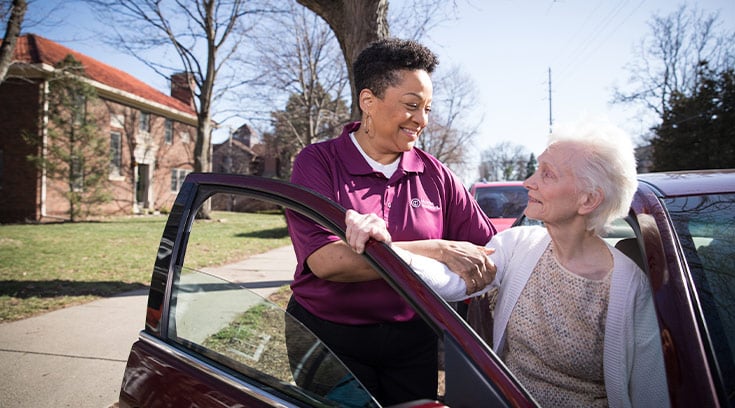Winter can be a wonderland. But it’s important to remember that snow, colder temperatures, and hours of darkness can pose risks to older adults.
Adults 65 and older are almost twice as likely to be hospitalized due to temperature-related injuries. And for areas that get ice or snow, winter can present a number of other health and safety issues.
“Winter weather is much more than a mere inconvenience; it can be extremely hazardous,” says Lakelyn Hogan Eichenberger, Ph.D., gerontologist and caregiver advocate at Home Instead. “While colder temperatures shouldn’t put your schedule on hold, venturing outside the home can be difficult, especially for those with health conditions, limited mobility, or vision impairment.”
Follow These 7 Winter Safety Tips
- Take Steps to Prevent Falls
Each year, about 3 million older adults are treated in emergency departments for a fall related injury, and icy conditions can lead to an increased risk of falling. During inclement weather, stay home when possible. If going to the grocery store or an appointment is necessary, consider asking someone (or hire a caregiver) to join and assist with navigating the icy terrain to and from the vehicle and driving.
Hire a professional or ask a friend to clear the driveway, steps and porches of snow and ice. Be sure to spread salt to reduce the risk of slipping for everyone. For a complete guide to home safety for older adults, see this checklist. - Go Digital When Possible
While it isn’t always possible to avoid going out into winter weather, there are plenty of ways to get what’s needed while staying home. If an older adult has a doctor’s appointment or is feeling sick, consider a telehealth visit with a physician, or use a meal-delivery service to have groceries delivered to the front door. Consider asking a family member or caregiver to help guide a senior through these digital processes if they are unfamiliar. Learn about the benefits of technology for aging adults. - Buy the Proper Winter Gear
Older adults are more vulnerable to the cold temperatures due to a lower metabolic rate, certain underlying medical conditions like diabetes and certain medications. Make sure aging loved ones have the proper winter wardrobe – a heavy waterproof coat, cozy hat, set of gloves, wool socks, and warm, gripping footwear. Even when staying in the house, dress warmly, in layers, and have blankets on hand. If an older adult uses a cane, make sure the tips are not worn. - Know the Signs of a Problem
Hypothermia and frostbite are both dangerous conditions that can occur after being exposed to extremely cold temperatures. Warning signs of hypothermia include shivering, slurred speech, slowed movement, and confusion or drowsiness. If an aging loved one experiences any of these signs, prioritize increasing their body temperature by moving into a warm room and removing any wet clothing, and call 911. - Winterize the House
Hypothermia can happen inside homes where heat settings are set too cold – or where the heater isn’t functioning properly. According to the Cleveland Clinic, a dangerously cold house can bring about hypothermia in less than 15 minutes. Check the HVAC heating system – it’s imperative to have a reliable heating system during the winter and know how to use it. - Pack an Emergency Kit
Most winter power outages occur when storms bring freezing rain, sleet, and high winds, damaging power lines and equipment. Plan ahead by packing an emergency kit, including a flashlight and first-aid kit, in an easy-to-find location. During an outage, stay calm, keep warm, and listen for weather service announcements on your phone or radio. - Keep the Cupboards Full
Severe ice or snow can keep the roads closed for days, so non-perishable food and water are a must in an aging adult’s home. Because they may have a limited supply, the higher-quality foods, the better. Items like peanut butter, whole wheat crackers, canned tuna and dried fruit are easy-to-store and offer high nutritional value.
Understanding how to stay safe when low temperatures and winter storms come along is crucial to an older adult’s health and well-being. Whether your area faces snow, ice, or just colder temperatures in the winter, it is important to take precautions to ensure aging loved ones can safely navigate inclement weather.
Compassionate Home Care




